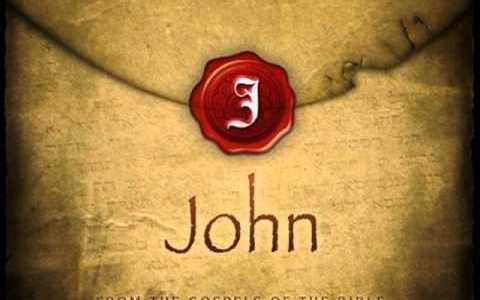John 8:12-20 Then spake Jesus again unto them, saying, I am the light of the world: he that follow me shall not walk in darkness, but shall have the light of life. The Pharisees therefore said unto him, Thou bear record of thyself; thy record is not true. Jesus answered and said unto them, Though I bear record of myself, yet my record is true: for I know whence I came, and whither I go; but you cannot tell whence I come, and whither I go. You judge after the flesh; I judge no man. And yet if I judge, my judgment is true: for I am not alone, but I and the Father that sent me. It is also written in your law, that the testimony of two men is true. I am one that bear witness of myself, and the Father that sent me bear witness of me. Then said they unto him, Where is thy Father? Jesus answered, You neither know me, nor my Father: if you had known me, you should have known my Father also. These words spake Jesus in the treasury, as he taught in the temple: and no man laid hands on him; for his hour was not yet come.
‘Then spake Jesus again unto them’ this statement proves that Jesus had been speaking to the Jews but was interrupted by the scribes and Pharisees who brought the woman to Him. ‘I am the light of the world: he that follows me shall not walk in darkness, but shall have the light of life’ The Jews added a ninth day to the feast on which they lit a lamp, putting it in the chest instead of the sacred books to illustrate Proverbs 6:23 and Psalm 119:105. Christ could have alluded to this, as well as to scriptures referring to the Messiah as a light from Isaiah 9:2; 49:6 and 60:1.
The Pharisees accused Jesus of testifying of Himself and made Him off as a liar. Jesus answered them by saying that He did bear record of Himself and that it was the truth because He knew where He came from and where He was going. He accused them of judging after the flesh; but that He didn’t and when He did judge, His judgement was true because He was not the only judge, but also the Father who has sent Him (Acts 17:32; Rom. 2:16).
It is also written in the Law (also called the Pentateuch or five books of Moses) that the testimony of two men is true. See Deuteronomy 17:6; 19:15 and 2 Corinthians 13:1. Jesus counted Himself as one witness and His Father as another.
‘Where is thy Father?’ If they truly knew Jesus, they would have known His Father. They really did not know Him as they claimed. A person cannot know one or the other without knowing both, for no man can come to Christ unless he is drawn by the Father (John 6:37, 39, 44). Eternal life is to know both (John 17:2-3; 1Jn. 5:20).
Jesus taught in the treasury many times (Mark 12:41; Luke 21:1; John 8:20). It was in the court of women. It had 13 chests, the 13th one for the women to put their offerings in. The other 12, which had the names of the 12 sons of Jacob on them, were for the men’s offerings.
‘For his hour was not yet come’ – they laid no hands on Him because they were powerless to arrest Him, not being permitted by God.

